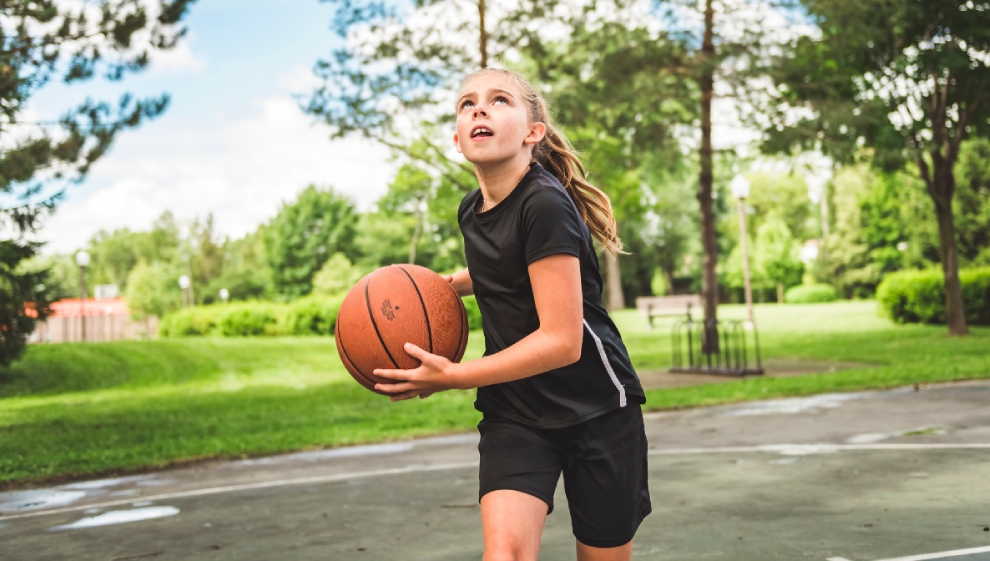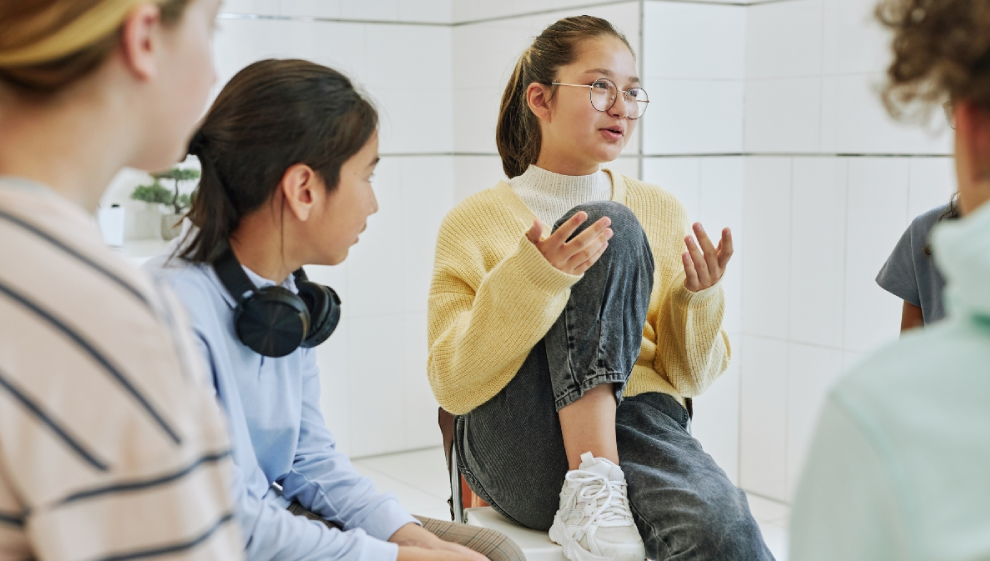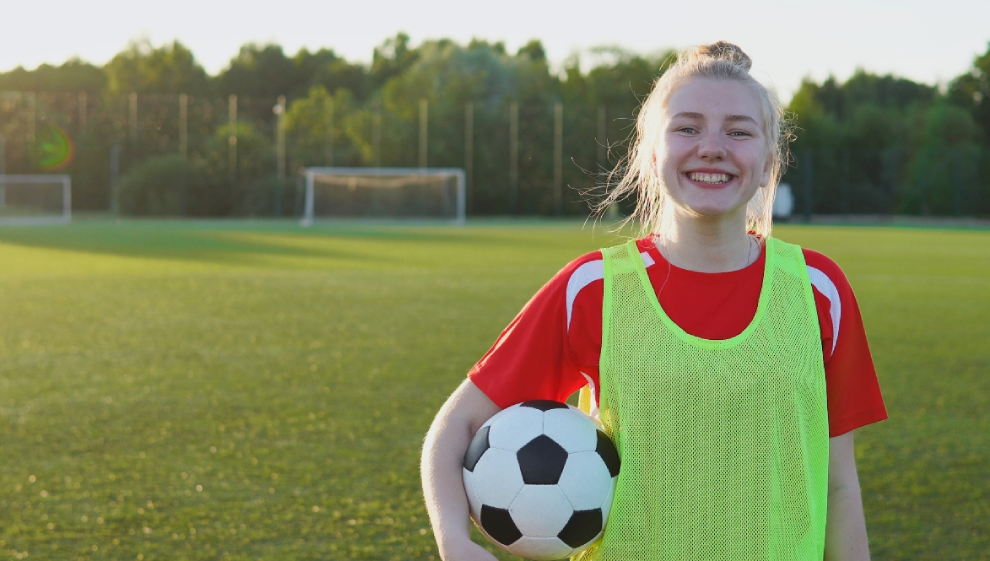The menstrual cycle and exercise | Advice for parents of teenage girls
- Overview
The facts and figures
- 33% of girls aged 11-16 are uncomfortable taking part in physical activity whilst menstruating
- Almost one in four (23%) say it makes them embarrassed to take part in physical activity
- 84% of teenage girls say their interest in sport lowered after starting their period
- Just less than one in five (17%) young girls say they don’t like P.E in school
- 40% of girls agree that health and fitness is important for them to look and feel good
- 44% of parents admit to making an excuse to get their daughters out of P.E. lessons when they’re menstruating.
Why expert advice is so important

Unfortunately, new research published by Nuffield Health confirms young girls still feel that getting their period has negatively affected their relationship with physical activity and exercise.
Societal taboos are reinforced by a lack of education on the subject, meaning the menstrual cycle is still seen as a barrier to enjoying exercise instead of something natural that can be worked around.
Periods at a glance
The full menstrual cycle typically lasts around 28 days (big variations are common) and sees a number of hormonal fluctuations occur in the body. During the cycle, the uterus prepares for potential pregnancy by shedding its inner lining (menstruation). This is followed by the development of a new lining.
Hormones like estrogen and progesterone regulate this process and can influence a girl's physical and emotional well-being, especially at a young age when pubescent changes are also occurring.
The impact of the menstrual cycle
- Physical symptoms: some common symptoms that might limit motivation to exercise include abdominal cramps, bloating, breast tenderness, fatigue, and mood swings
- Lack of awareness: many young women may not know about the tools available to help them exercise in comfort whilst menstruating. This serves to reinforce societal taboos which can leave young girls feeling embarrassed or ashamed
- Fear of leakage: concerns about leakage accidents when moving about still carry the potential for embarrassment with young girls. This can discourage them from participating in physical education (P.E.) lessons at all, especially if they do not have access to appropriate menstrual hygiene products.
Low confidence during puberty
Puberty is a time of change, both physical and mental. For young girls, the onset of their period can amplify issues around negative self-image and confidence. Getting dressed and performing exercise with or in front of others can transform from something we didn’t think twice about at a young into an emotional undertaking.
What can parents do to help?
Periods can be tricky to talk about. Unfortunately, by keeping quiet and giving unhelpful education to young girls, we end up reinforcing the stereotypes that serve to limit their access to physical activity.
Take a look below to explore what we can all do to help more young girls access and enjoy exercise during puberty.
Raise education and awareness standards

With better education and transparency on the subject, these barriers begin to break down. By shining a light on the issues young girls face when it comes to adolescence and exercise, we hope to shift the conversation toward how we can all better help open avenues for more girls to enjoy exercise and sport.
Providing young girls with comprehensive menstrual health education at school benefits everyone. The basic information about the menstrual cycle needs to be supplemented with practical advice on proper hygienic practice, discussion about emotional wellbeing, and how to approach sport when a girl starts getting her period.
Education helps dispel myths, empowering young girls to make informed choices and feel more confident about participating in physical activity. Discussing things like how to choose the right sanitary product helps normalise the topic and remove stigma and taboo.
Encourage and normalise self-care
Part of improving the quality of education we give young girls involves teaching girls about effectively managing the symptoms that accompany their period.
Some things girls can be encouraged to do include:
- Regularly taking a hot bath or shower
- Prepare and make sure they’re stocked up on sanitation supplies
- Prioritise adequate rest and recovery
- Apply a heat pack or hot water bottle to help relieve aches and pains
- Listen to their body and embrace self-compassion
- Engage in gentle stretching exercises like yoga or Pilates
Foster supportive environments

Family environments, schools, sports clubs, and other safe spaces all play a vital role in creating an inclusive environment where girls feel comfortable discussing their period. This includes granting access to sanitary products, clean restrooms with discreet disposal options and creating spaces where girls can share how they’re feeling without fear of shame or judgement.
This is imperative when it comes to physical education lessons at school. Just shy of one in five (17%) young girls say they don’t like P.E. in school and 44% of parents admit they have made an excuse to get their daughters out of P.E. lessons because they’re menstruating. Alternative exercises are often not adequate, leaving girls at risk of feeling left out and isolated.
Provide easy access to sanitary products
Ensuring girls have access to pads, tampons, menstrual cups and other sanitation products from a young age is crucial. Normalising the availability of menstrual hygiene products and the discussion of sanitation practices at a young age helps eliminate the taboo surrounding the subject and gives young girls the courage to demand more from the institutions they belong to.
This helps create a culture where young girls refuse to accept their period as something that is seen as a limitation. When schools and sports clubs make sanitary products readily available without question, girls are more likely to feel they’re in an environment that doesn’t see the menstrual cycle as something taboo that they should have to tolerate in silence.
Remember every girl is different
What works for one person isn’t relevant for someone else. This is especially relevant when trying to improve the number of young girls engaging in sports. The fatigue and brain-fog that are a big part of one person’s period experience may not prove an issue for another. It’s important we don’t assume that one set of symptoms apply to everyone.
Last updated Wednesday 11 October 2023
First published on Wednesday 11 October 2023

